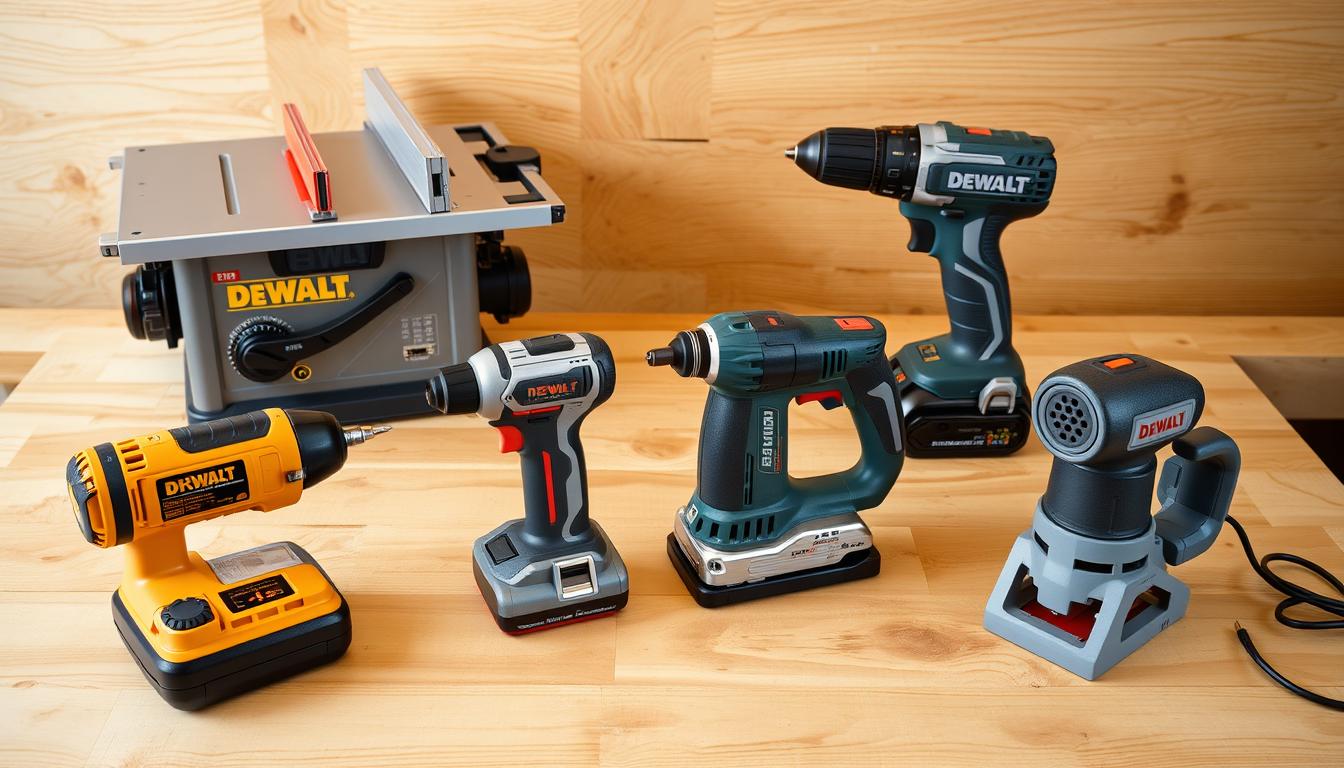There’s a saying among carpenters—you’re only as good as your tools. As I started woodworking, I learned that great craftsmanship comes from choosing the right woodworking tools. My first precisely squared joint made with a chisel was a thrill. And the smooth finish from my orbital sander made me proud. Woodworking is more than a skill; it’s a journey of self-expression.
Starting to turn raw lumber into something useful and beautiful is exciting. It begins with the right power tools for woodworking. These tools offer both efficiency and precision. It’s not just about filling your workshop; it’s about choosing the right tools for your journey. From table saws to bandsaws, each tool is a step towards success.
While it’s tempting to fill your workshop quickly, wisdom advises patience. Woodworking hand tools are the heart of your story. Whether it’s chisels for joinery or clamps for bonds, we choose tools for their function and how they connect with our craft. The smell of planed wood or the sound of a mitre saw can deepen our connection to woodworking1.
Table of Contents
ToggleKey Takeaways
- Begin with essential woodworking tools that match your projects’ needs1.
- Invest in quality hand tools to establish a strong foundation in woodworking skills.
- Understand the unique benefits of both corded and cordless power tools for woodworking.
- Gradually build your tool collection, prioritizing tools that enhance your craftsmanship.
- Always consider the longevity and functionality of tools before purchase1.
- Recognize the special role each tool plays in the harmony of creating woodwork.
>>Get 16,000 Woodworking Plans
Understanding the Basics of Woodworking Tools
Starting in woodworking can feel overwhelming, but learning about tools makes it easier. Quality tools are key to any project’s success. Each tool, like chisels, plays a crucial role in creating wood pieces.
What Are Woodworking Tools?
Woodworking tools are designed for cutting, shaping, and finishing wood. They include hand tools, power tools, and woodturning tools. Hand tools, like chisels, are vital for detailed work. Woodturning tools help shape wood in a lathe, adding finesse to your work.
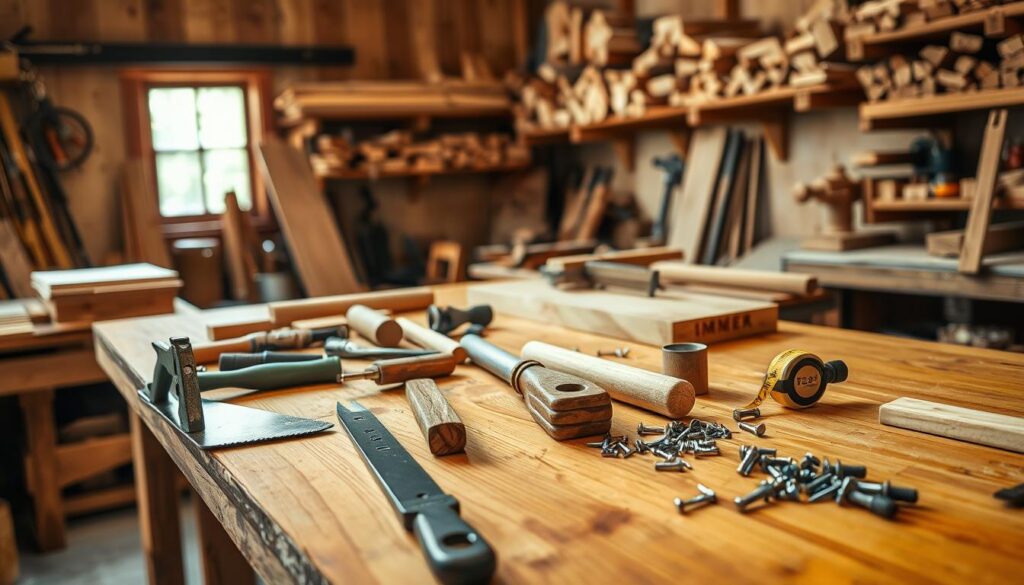
Importance of Quality in Tools
High-quality tools improve your work’s precision and safety. Tools like cordless drills and miter saws are essential for professional results. They are made with durable materials, making your woodworking better.
Choosing the right tools, like jigsaws and sanders, is key for detailed cuts and smooth surfaces. The quality of clamps also affects your project’s success. They keep your work stable and precise.
Knowing and using these tools well is the start of building skills that last. It’s not just about having the right tools. It’s about understanding their capabilities and using them right for each task.
Must-Have Hand Tools for Beginners
Starting your woodworking journey means picking the right tools. I’ll show you the key hand tools every beginner needs. They help you learn and do great projects.
Chisels: Types and Uses
The Versatility of Hand Saws
Essential Clamps for Projects
Clamps are crucial for stability in woodworking. Beginners need various clamps like pipe, bar, and strap clamps. They keep your work steady, safe, and precise.
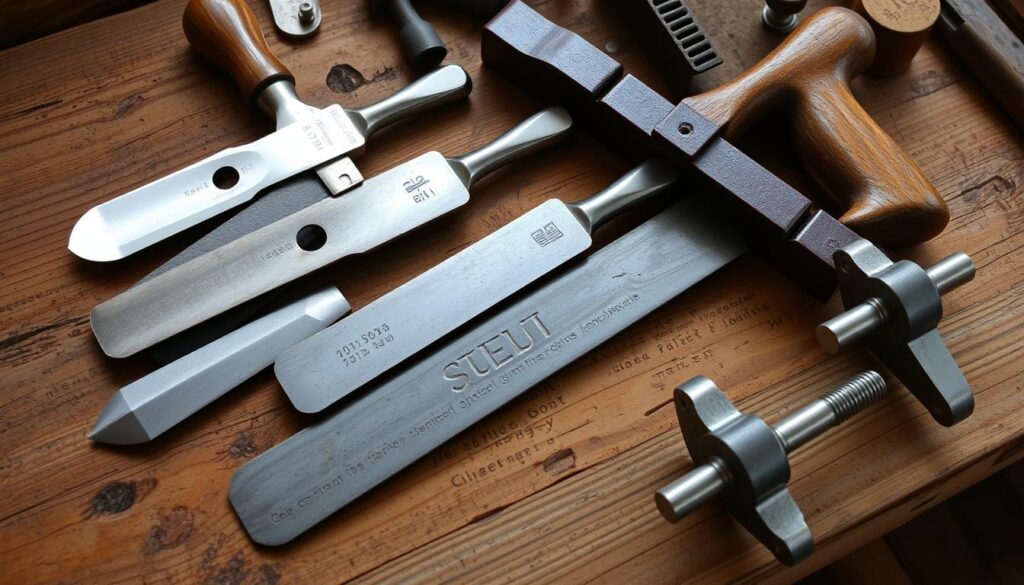
Adding these basic tools to your collection will boost your skills and fun in woodworking. The right tools make your work easier and better with every project.
Key Power Tools for Woodworking
Welcome to the exciting world of woodworking! Power tools are key to turning beginner projects into masterpieces. The right tools make your workshop better and open up new creative possibilities.
Introduction to Power Tools
For beginners, power tools like circular saws, jigsaws, routers, and sanders are a big help. The DeWalt 20-Volt Max Lithium Ion Drill Driver/Impact Driver Combo Kit is a top choice. It has over 36,000 five-star reviews on Amazon, showing its quality and reliability6. These tools are easy to use and versatile, helping new woodworkers complete many projects.
The Benefits of Corded vs. Cordless
Choosing between corded and cordless tools depends on your project needs. Cordless tools are great for their convenience and portability. The Craftsman 20V Cordless Variable Speed Jigsaw is easy to handle and adjust, perfect for detailed work6. Corded tools, like the Bosch Colt 1.25 HP Variable-Speed Palm Router, offer sustained power for intense tasks6.
Recommended Power Tools for New Woodworkers
For your first toolkit, some tools are essential. The Makita LXT Lithium-Ion Cordless 6-1/2-in. Plunge Circular Saw is a top pick for high performance and detailed cuts6. The Bosch Sander is a good choice for finishing touches, priced at $54.996. The DeWalt 20V Oscillating Multi-Tool Kit, priced at $176.79, is great for various projects6.
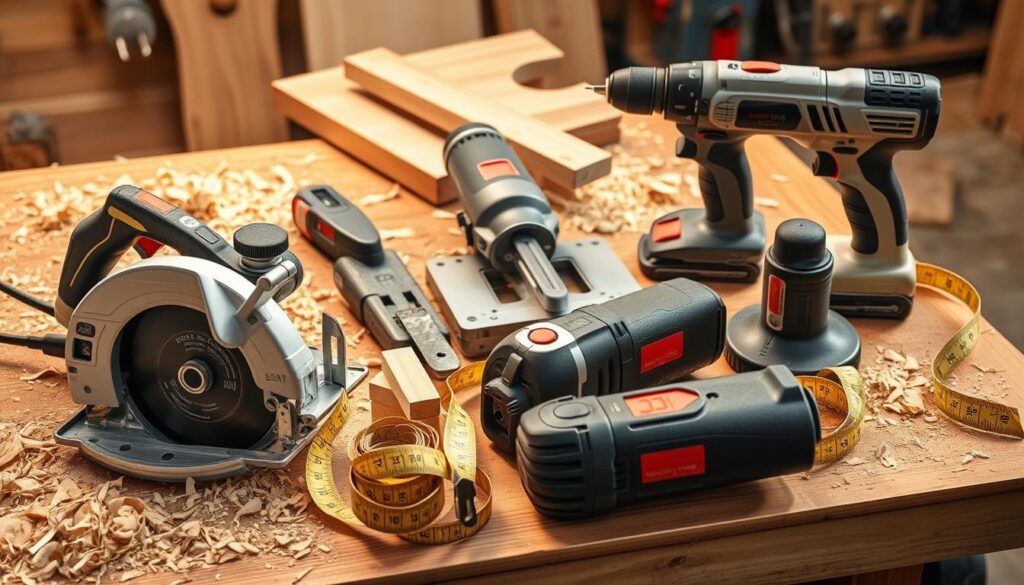
| Power Tool | Brand | Recommended for |
|---|---|---|
| Circular Saw | Makita LXT | High Performance Cutting |
| Jigsaw | Craftsman 20V | Intricate Shapes and Patterns |
| Router | Bosch Colt | Detailed Edge Work |
| Random Orbital Sander | Bosch | Smooth Finishes |
| Oscillating Multi-Tool | DeWalt 20V | General Cutting and Sanding |
Getting these core power tools will boost your woodworking skills. They offer precision and flexibility for your projects. Start your woodworking journey with these essential tools.
Safety Gear and Practices
Woodworking is a world where safety is key. It’s not just a suggestion; it’s a must to keep us safe. In a workshop, injuries, harmful substances, and flying debris are big risks. So, safety is very important.
Importance of Safety Glasses
Safety glasses are a must for me. They protect my eyes from wood shavings, dust, and more. This is crucial for keeping my eyes healthy while I work.
Hearing Protection Essentials
Proper Attire and Footwear
These safety items together offer great protection. Spending about $200 on safety gear is worth it for the safety it provides8.
>>Get 16,000 Woodworking Plans
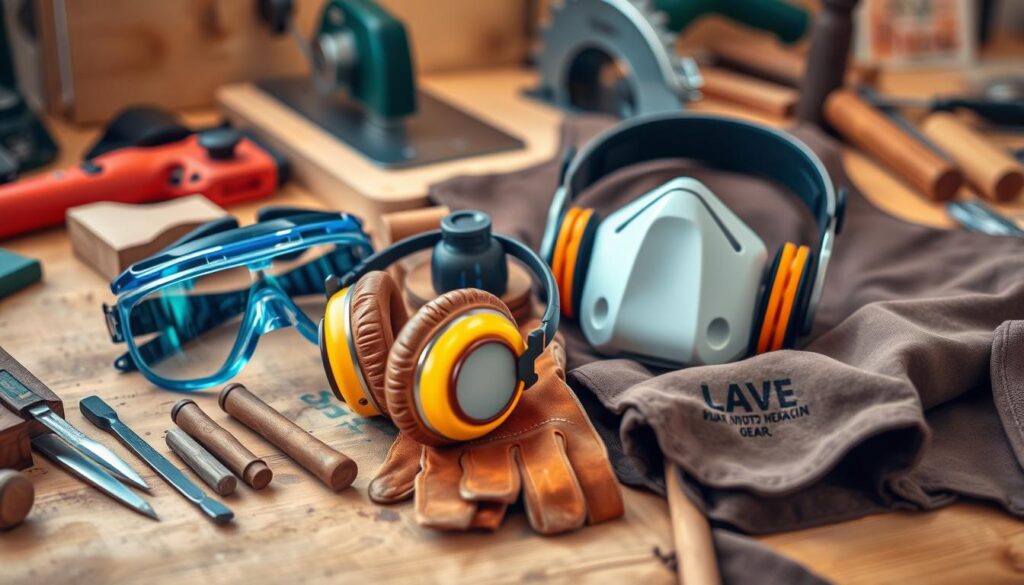
Woodworking safety isn’t just about personal safety. The environment matters too. Having firefighting equipment in the workshop adds an extra layer of safety8.
For those who love woodworking, learning about safety gear is crucial. Check out this NoCry blog for tips on safety equipment and practices. It shows why investing in quality gear and staying informed is important.
Essential Measuring and Marking Tools
Woodworking requires precise measuring and marking tools. These tools help make accurate cuts and ensure projects last long and look good. Here, I’ll talk about the essential tools every woodworker, especially beginners, should have.
Tape Measures: Choosing the Right One
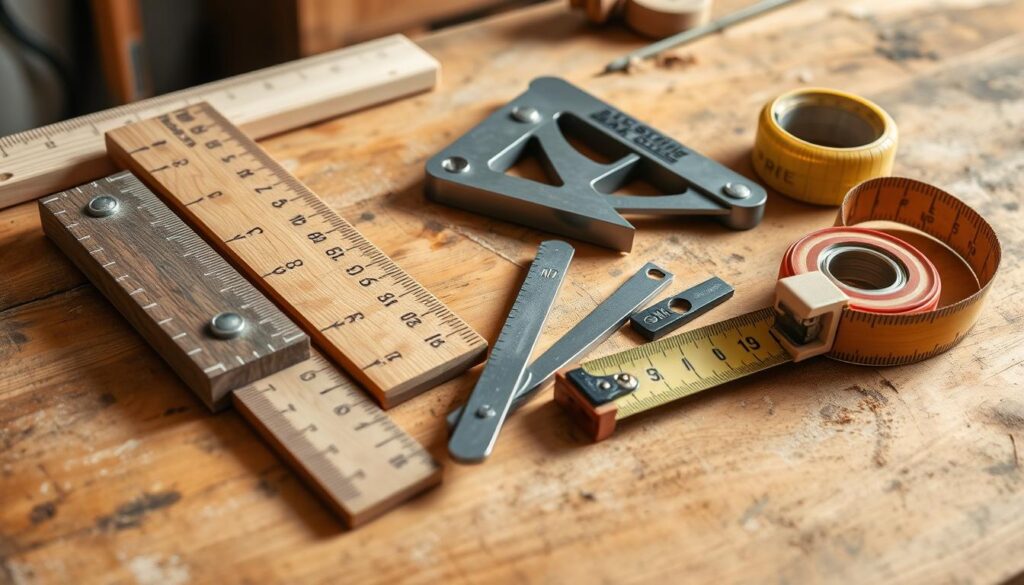
Layout Squares and Their Uses
In conclusion, having the right measuring and marking tools is crucial for woodworkers. The right tools make your work flow better and reduce mistakes from wrong measurements or markings.
Tool Storage Solutions
Efficient woodworking relies heavily on woodworking tool storage. A well-organized system boosts productivity and keeps your workspace tidy. This makes your workflow smoother.
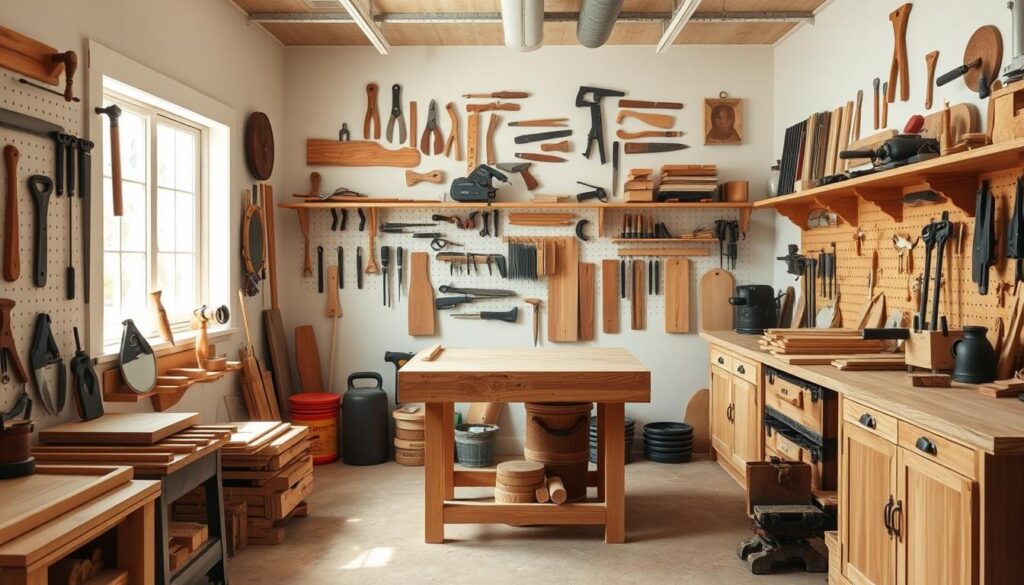
Organizing Your Workspace
It’s key to organize tools well in any woodshop. Wall-mounted tool cabinets and Dutch tool chests protect tools from dust and damage. The Dutch tool chest is great for small workshops because it saves floor space11.
Using VCI pots or dehumidifiers helps fight humidity. This is important to prevent rust and corrosion on tools12.
Toolboxes vs. Workbenches
Deciding between toolboxes and workbenches depends on your workshop’s needs and space. Toolboxes are mobile and good for small tools. Workbenches, however, are essential for projects and offer more space11.
| Storage Type | Benefits | Drawbacks |
|---|---|---|
| Toolbox | Portable, versatile | Limited space |
| Workbench | Ample space, integral for projects | Immobile, requires more room |
| Dutch Tool Chest | Large capacity, minimal floor usage | Fixed location |
| Wall-Mounted Cabinet | Protects from dust, space-efficient | Installation needed |
Using moisture absorbers and WD-40 Specialist Corrosion Inhibitor protects tools. This keeps them in good condition for projects12.
Whether you pick a toolbox or a workbench setup, aim for efficient tool storage. Good organization and easy access make woodworking more productive and fun.
>>Get 16,000 Woodworking Plans
Learning to Maintain Your Tools
Keeping your woodworking tools in good shape is more than just keeping them working. It’s about making sure they help you do your best work. Taking care of your tools can make them last longer and work better, making your projects more enjoyable.
Basic Tool Maintenance Tips
Sharpening Woodworking Tools
Learning to sharpen chisels is a must for woodworkers. Using a sharpening stone or honing guide keeps your chisels sharp15. This is important for all kinds of blades and bits.
- Regularly check tools for wear or damage and fix problems quickly to avoid accidents.
- Use oil or the right lubricant on moving parts for smooth use and rust protection.
- Make sure all tools are sharp before starting a project, as dull tools can lead to bad work and injuries.
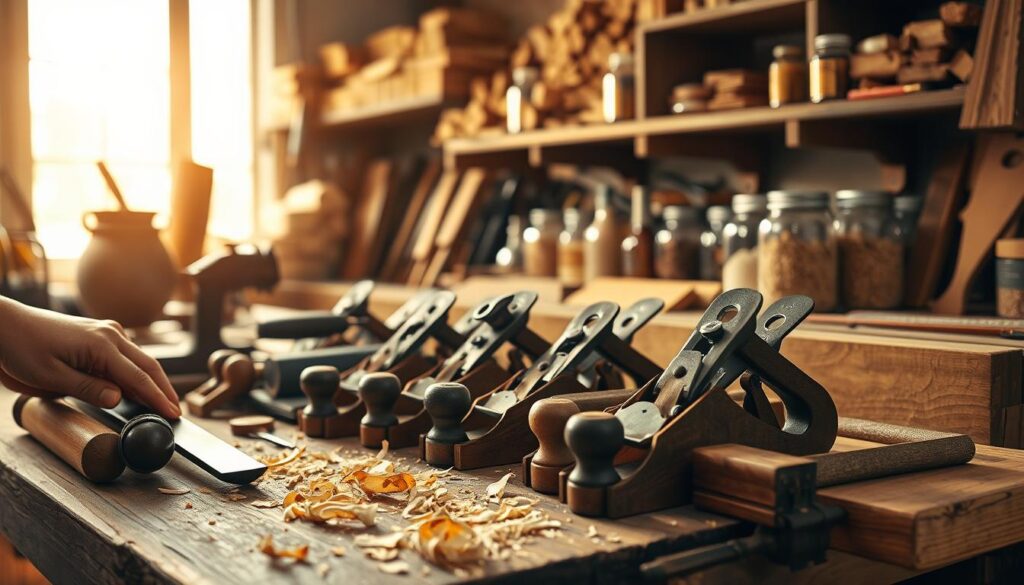
By following these easy steps, you can make your tools last longer and improve your woodworking. Remember, a well-kept tool set is key to successful woodworking.
| Tool Type | Maintenance Frequency | Specific Care Needed |
|---|---|---|
| Chisels | After Every Use | Clean, Dry, and Sharpen |
| Saws | Bi-weekly | Clean Blade, Check for Dullness |
| Measuring Tools | Monthly | Calibration Check, Clean |
Resources for Beginner Woodworkers
Exploring woodworking is exciting, and having the right tools is key. Whether you’re new to woodworking or want to improve, this guide is for you. It covers online courses, books, and workshops perfect for beginners.
Online Courses and Workshops
Online woodworking courses are a great way to start. They teach you the basics and more advanced skills. You’ll learn about tools, wood, and how to build things.
Workshops offer hands-on learning and a chance to meet experienced woodworkers. Sites like Wood and Shop and Hand Tool School by Shannon Rogers are great for learning from experts16.
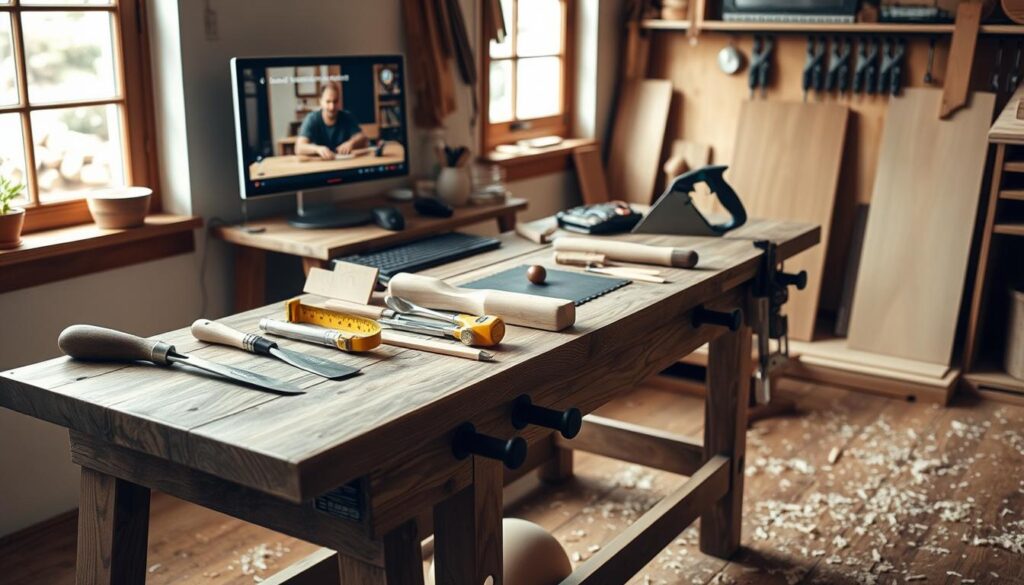
Popular Woodworking Books to Consider
Books can deepen your woodworking knowledge. “The New Traditional Woodworker” by Jim Tolpin is highly recommended. It has detailed projects and tips on using tools16.
Other great books include “Choosing and Using Hand Tools” by Andy Rae and “The Unplugged Workshop” by Tom Fidgen. They cover tools, DIY projects, and more. These books inspire and teach you to be precise and creative in your woodworking16.
| Tool Type | Description | Utility |
|---|---|---|
| Power Drills (Cordless) | Varying voltages with 18-volt models providing versatility17 | Essential for drilling holes and driving screws efficiently |
| Circular Saws | Options include ripping, crosscut, and combination blades17 | Crucial for making straight cuts across the wood grain |
| Miter Saws and Table Saws | High horsepower for precise cutting capabilities17 | Ideal for detailed and angle cuts in woodworking projects |
Using both online and printed resources can improve your skills. It also connects you with other woodworkers. Dive into these resources and see your woodworking skills grow!
Joining the Woodworking Community
Woodworking is my passion, and joining the community is key to improving. I’ve found that local groups and online forums are invaluable. They help me learn and grow as a woodworker.
Finding Local Woodworking Groups
Local woodworking groups are full of knowledge and friendship. Going to meetings and workshops lets me meet others who love woodworking. We share tips, tools, and projects, which boosts my skills and confidence.
Online Forums and Resources
Online forums are a great addition to local groups. They connect me with woodworkers worldwide anytime. I get advice on tough projects and learn about new tools and techniques.
Being part of both local and online communities has been rewarding. It’s a place where we share ideas and learn from each other. This exchange of knowledge and passion makes us all better woodworkers.
| Benefits | Local Groups | Online Forums |
|---|---|---|
| Networking Opportunities | High | Moderate to High |
| Skill Enhancement | Direct mentoring and hands-on practice | Wide range of global techniques |
| Resource Sharing | Tools and local materials | Reviews and deals on tools |
| Project Inspiration | Craft shows and local projects | International ideas and trends |
| Emotional Support | Personal interactions | 24/7 availability |
Building a strong woodworking network is about both in-person and online connections. Each has its own benefits. Together, they make my woodworking journey richer and more fulfilling.
>>Get 16,000 Woodworking Plans
Conclusion: Starting Your Woodworking Journey
Reflecting on what we’ve learned, I feel excited to start your woodworking journey. It’s full of potential and satisfaction. You’ll use tools like the miter saw and chisels, which are more than tools—they’re your creative partners.
Your first tools, like a power drill and tape measure, are key for accuracy and creativity in your projects18.
Remember, 40% of woodworkers love using hand planes for their unique touch19.
Encouragement to Get Started
My last tip is to start now. Every piece of wood you cut and every measurement you make is a step forward. Be patient and learn from your mistakes. Woodworking is a journey of growth, where every tool you add improves your skills19.
As you get better, your toolkit will grow too. You’ll start with hand tools and add power tools as you become more skilled19.
Final Tips for Beginners
Focus on the tools that 35% of woodworkers say are essential: measuring and marking tools. These tools are key for precision in your projects19. Start simple, knowing that even small tasks are the beginning of something amazing.
Woodworking has taught me that each project brings new challenges and joys. So, dive in, learn as you go, and enjoy the journey of creating with your hands and heart.
FAQ
What Are Woodworking Tools?
Woodworking tools help cut, shape, join, and finish wood for projects like furniture and decorations. They range from simple hand tools to complex power tools.
Why is Quality Important in Woodworking Tools?
Quality tools are made with better materials, leading to better performance and durability. They make woodworking easier and safer, resulting in better projects.
What Types of Chisels Do I Need and What Are They Used For?
Beginners need a basic set of chisels with different blade widths. Chisels are key for carving, shaping, and refining wood joints.
What Makes Hand Saws Versatile in Woodworking?
Hand saws come in various types and sizes for different cuts. They allow for precise cuts, coarse cuts, and more, making them versatile.
Why Are Clamps Essential for Woodworking Projects?
Clamps hold workpieces securely, ensuring stability and precision during tasks. They come in different styles for different needs and sizes.
What Are the Core Power Tools for a Beginner Woodworker?
Beginners need circular saws, power drills, jigsaws, routers, and sanders. These tools help cut, drill, shape, and finish wood efficiently.
What Are the Benefits of Corded vs. Cordless Power Tools?
Corded tools offer consistent power and unlimited run time, great for heavy use. Cordless tools are portable and convenient, ideal for jobs that require movement.
How Important Are Safety Glasses in Woodworking?
Safety glasses protect your eyes from debris and dust. They are a key safety measure to prevent serious injuries.
Why is Hearing Protection Essential in Woodworking?
Hearing protection is vital because many tools are loud and can cause hearing damage. Use earmuffs or earplugs when using loud machinery.
What Kind of Tape Measure is Best for Woodworking?
Choose a tape measure based on precision and ease of use. A retractable metal tape measure is durable and accurate. Digital tape measures offer convenience and extra features.
How Do I Choose the Right Layout Squares for My Projects?
Select layout squares based on reliability and versatility. A combination square measures angles, while a bevel gauge transfers irregular angles. Look for durable materials with accurate markings.
Should I Use a Toolbox or Workbench to Organize My Tools?
The choice depends on your workspace size and tool number. A toolbox is portable for smaller collections. A workbench is better for a larger variety and provides a stable surface.
What Are Some Basic Tool Maintenance Tips?
Clean tools after each use to remove debris and moisture. Store them properly to prevent damage. Check for wear or rust and sharpen edges as needed.
What Are the Most Effective Ways to Sharpen Woodworking Tools?
Tools can be sharpened using the Scary Sharp System or sharpening stones. Honing guides help maintain the correct angle for consistent results.
Where Can Beginner Woodworkers Find Educational Resources?
Beginners can find resources in online courses, community college classes, and woodworking workshops. Books and magazines also offer foundational and advanced techniques.
How Can I Connect with Other Woodworkers?
Join local clubs, attend workshops, and use online forums and social media. These communities are great for advice, feedback, and inspiration.
What Should Beginners Focus on When Starting Woodworking?
Beginners should learn tool safety and basic techniques. Start with simple projects and improve with practice. Learning from mistakes and being patient is key.
Source Links
- 10 Essential Woodworking Tools To Start Your Shop — Blacktail Studio – https://www.blacktailstudio.com/blog/essential-woodworking-tools
- Beginners Guide To Essential Woodworking Tools – https://www.thegoodlifecentre.co.uk/essential-woodworking-tools-for-beginners/
- 9 Most Essential Woodworking Tools For Beginners – American Rotary – https://www.americanrotary.com/blog/woodworking-tools-for-beginners/?srsltid=AfmBOopoIfCoDaGl6B0JNZGWJzr2sg9wHBLGZQU6HaMjIVZDFR0V7zEc
- 20 Woodworking Hand Tools List For Beginners – https://woodandshop.com/which-hand-tools-do-you-need-for-traditional-woodworking/
- Hand Tool Woodworking Instruction and Thoughts – https://www.renaissancewoodworker.com/a-real-world-list-of-hand-tools-for-getting-started/
- 10 Woodworking Portable Power Tools – https://www.familyhandyman.com/list/woodworking-portable-power-tools/?srsltid=AfmBOorjd3jICW72lt73j_ufAguP71WSaEuHgO3h9vgarJ0goPXBmjAi
- 5 essential pieces of woodworking safety equipment – https://nocry.com/blogs/news/5-essential-pieces-of-woodworking-safety-equipment?srsltid=AfmBOookZgU4OYVzRMIzmSO8pBPL8ikzNSzywL10xQ79W1vJU2K-6yTG
- Safety Equipment for Woodworking You Must Have – https://dycoventures.com/blogs/articles/safety-equipment-for-woodworking-you-must-have?srsltid=AfmBOopjUvlGRmoTui0JkQ5pW1bn33fcXpErEGAq8xV2A4uRleEF2KkG
- Essential Measuring Tools for Woodworkers – https://toolstoday.com/learn/essential-measuring-tools-for-woodworkers?srsltid=AfmBOor5lC1AiFE5ZLrZWNPSTf4FoivMxPrk7h7NHIyWm5AEJHyvnFnP
- 11 Essential Measuring and Marking Tools – FineWoodworking – https://www.finewoodworking.com/project-guides/hand-tools/11-essential-measuring-and-marking-tools?srsltid=AfmBOor8rD_n7wCp7lqQ7feeInikMny6xeM6Qm734cmpyMpvBwjRRCRc
- The Top 15 Essential Woodworking Tools – https://learn.kregtool.com/learn/best-woodworking-tools/
- Topic: Tool storage ideas – https://woodworkingmasterclasses.com/discussions/topic/tool-storage-ideas/
- Getting Started With Hand Tools? [The Beginner’s Woodworking Kit] – https://www.theenglishwoodworker.com/woodworking-hand-tools/
- Woodworking for Beginners: Everything You Need to Know – https://learn.kregtool.com/learn/woodworking-for-beginners/
- 11 Woodworking Tools for Beginners – https://www.familyhandyman.com/list/beginner-woodworking-tools/?srsltid=AfmBOoq9UApVxV4ZpifRjmmNGXlIaSaqvK_835FaisUBaIFUNQD_Wz5w
- What tools are needed for a beginner woodworker – https://sawmillcreek.org/showthread.php?290442-What-tools-are-needed-for-a-beginner-woodworker&p=3108525
- 9 Most Essential Woodworking Tools For Beginners – American Rotary – https://www.americanrotary.com/blog/woodworking-tools-for-beginners/?srsltid=AfmBOoook2PYAtkKeJMOhXjyhGj-E28Fg8m3jj24jBB2m5KQp15PqakN
- 22+ Essential Woodworking Tools: A Comprehensive Guide for Beginners – https://industrydiy.com/woodworking/essential-woodworking-tools/
- How to Choose Tools for First-Time Woodworkers – https://www.thisoldhouse.com/woodworking/21017112/how-to-choose-tools-for-first-time-woodworkers

